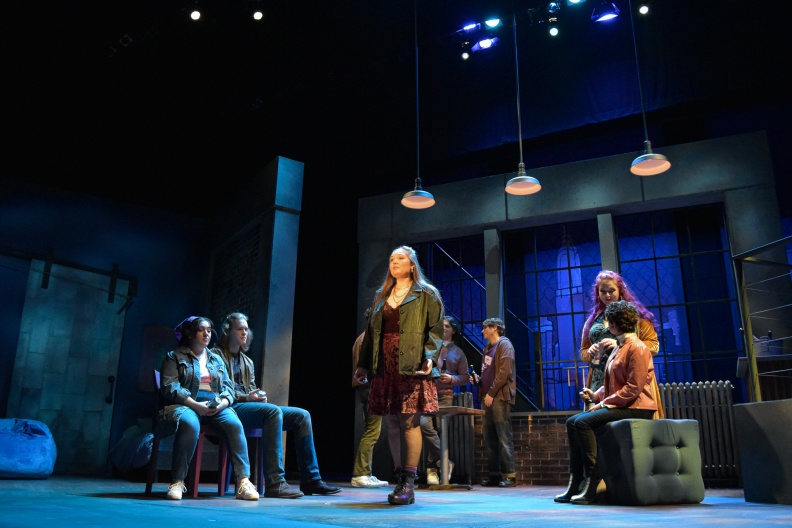“You Never Know” what you may find on Binghamton University’s diverse stages, and this past weekend saw the theatre department’s rendition of Joey Contreras’ “In Pieces.”
“In Pieces” is about as contemporary as a musical can get — it fuses non-diegetic storytelling and modern pop songs to weave a tapestry of love, loss and life. The show followed a group of different young students and professionals in a bustling city whose paths cross and collide while they all try to figure out their identity and learn just what it means to find love.
“In Pieces” director Tommy Iafrate, an associate professor of theatre and director of musical theatre, said he was drawn to the musical’s nontraditional structure when he was looking for this season’s shows.
“It’s been a while since we’ve done a piece that feels so contemporary and is rooted in a modern pop/rock musical vocabulary,” Iafrate wrote in an email. “[Contreras] is a pop musical theatre composer, and his songs are very catchy in the same way that contemporary pop songs feel. That was a really exciting departure from the other types of musicals we’ve done in recent years. While some of them have had pop/rock influences, none fit so squarely in the pop genre as ‘In Pieces’ does. This was a different and truly modern piece.”
The production presented some interesting challenges to the cast and crew. For one, the performance was completely virtual. Ticket holders were brought to a digital portal that allowed them to watch show. Given the need to make the show camera-friendly, the virtual aspect was constantly on Iafrate’s mind.
“The fact that this musical was being produced for camera and not for a live audience was a constant consideration in the back of my mind throughout the process,” Iafrate wrote. “This was a major consideration when talking about scene design and heavily factored into where I would place different people onstage — especially when the visual focus could be split between people at different parts of the stage. That was a fun and different kind of challenge. When I actually sat down to consider different camera angles and how zoomed in those cameras could be, that was unlike anything I’ve done before. I had a great time figuring out which angles would best capture the acting moments that I found most compelling, and when to take a wider shot of the full stage to remind the audience that we’re on a stage in a [theater], and when to zoom in so that we could read an actor’s thoughts as they wrestled through the lyrics of a song.”
The virtual medium also produced an interesting challenge for the performers. For Derrick Weisburd, a sophomore double-majoring in systems science and industrial engineering and theatre who played Charlie, this challenge was an exciting one.
“I was actually quite excited when I learned of the format of the show,” Weisburd wrote in an email. “I really like the subtlety of [on-screen] acting, because cameras can capture small moments and tiny details that you just cannot grasp in a packed audience of people. Playing to a camera allowed me to connect more emotionally to Charlie, knowing that even the slightest grin would be picked up and understood by the camera. It made the experience more natural and organic to be quite honest, and I thoroughly enjoyed the [nontraditional] format. It was new. It was exciting. I like taking on new challenges and experimenting, and this allowed me to do so. That was really fun.”
Another unique aspect of the show is the fact that it is a song cycle — a collection of individually written songs that are then brought together to produce one cohesive narrative. This narrative is created without any dialogue beyond the lyrics themselves.
Briana Ibanez, a sophomore majoring in psychology who played Jael, described performing in a song cycle as “strange.”
“It was honestly so strange performing in a song cycle as opposed to a traditional musical,” Ibanez wrote in an email. “I had to warn everyone that it wouldn’t have a plot before watching, so they wouldn’t look for one. I think one of the strangest things about performing a song cycle is that the people that you are starring with don’t have a direct and literal effect on your story, but they still do in an indirect way. I think that in a way captures the idea of the city and the way that you may not really know someone and they may not have a direct effect on you, but they still feed into the bigger energy of the city and the people in the city.”
It was the lack of spoken dialogue that led Bethany Miller, a senior majoring in biology who played Alex, to use a different approach for preparation.
“In the traditional musicals I’ve worked on in the past, I’ve typically had a scene partner to share dialogue with or interact with, but this song cycle was mostly working on scenes and songs on my own,” Miller wrote in an email. “This gave me the opportunity to really focus on character development through song and gave me a lot of time to self-reflect in Alex’s headspace. This was also a vocally demanding score, and no dialogue meant no breaks in singing which was a little tough. However, I’m super grateful to have a new experience under my belt.”
For the audiences that got to watch the show, Iafrate has a shortlist of things he hopes they took away from it.
“I want them to take away the hope and possibility of the future,” Iafrate wrote. “I want them to smile and root for those still looking for love. I want them to have some of the songs in their heads and keep listening to [Contreras’] music. I want them to be curious enough about musical theatre that they take a performance course and/or audition for productions in a future semester.”



